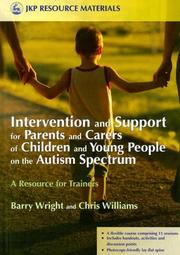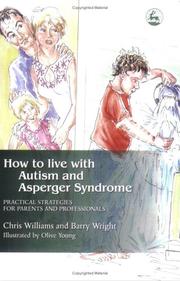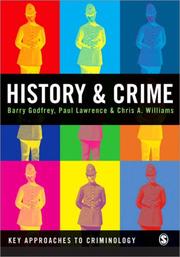| Listing 1 - 10 of 13 | << page >> |
Sort by
|
Book
ISBN: 9780719084294 1781707979 9781781707975 9781526102584 1526102587 0719084296 1526102595 Year: 2017 Publisher: Baltimore, Maryland : Baltimore, Md. : Project Muse, Project MUSE,
Abstract | Keywords | Export | Availability | Bookmark
 Loading...
Loading...Choose an application
- Reference Manager
- EndNote
- RefWorks (Direct export to RefWorks)
During the last two centuries, the job of policing in Britain has been transformed several times. This book analyses the ways that police institutions have controlled the individual constable on the 'front line'. The eighteenth-century constable was an independent artisan: his successor in the Metropolitan Police and other 'new' forces was ferociously disciplined and closely monitored. Police have been controlled by a variety of different practices, ranging from direct day-to-day input from 'the community', through bureaucratic systems built around exacting codes of rules, to the real-time control of officers via radio, and latterly the use of centralised computer systems to deliver key information. Police forces became pioneers in the adoption of many technologies - including telegraphs, telephones, office equipment, radio and computers - and this book explains why and how this happened, considering the role of national security in the adoption of many of these innovations. It will be of use to a range of disciplines, including history, criminology, and science and technology studies.
Police --- Police administration --- History --- Technological innovations --- Cops --- Gendarmes --- Law enforcement officers --- Officers, Law enforcement --- Officers, Police --- Police forces --- Police officers --- Police service --- Policemen --- Policing --- Criminal justice, Administration of --- Criminal justice personnel --- Peace officers --- Public safety --- Security systems --- Police management --- Management --- History. --- Legal status, laws, etc. --- Administration --- Police - Great Britain - History --- Police administration - Great Britain - History --- Police - Technological innovations - Great Britain --- Bureaucracy. --- Communication. --- Computing. --- Great Britain. --- Police. --- Technology.
Book
ISBN: 0708324444 129920113X 9780708324448 9781783162932 1783162937 9780708324424 0708324428 9780708324431 0708324436 9781299201132 Year: 2011 Publisher: Cardiff University of Wales Press
Abstract | Keywords | Export | Availability | Bookmark
 Loading...
Loading...Choose an application
- Reference Manager
- EndNote
- RefWorks (Direct export to RefWorks)
This volume consists of twelve essays from leading scholars and younger researchers on various aspects of the life, work and legacy of Robert Owen (1771-1858). A radical thinker and humanitarian employer Owen made a major contribution to nineteenth-century social movements including co-operatives, trade unions and workers' education. He was a pioneer of enlightened approaches to the education of children and an advocate of birth control. He established utopian communities in both the United Kingdom and the United States of America, and is often thought of as a leading early British socialist.
Educators --- Education --- Social reformers --- Reformers --- Educationalists --- Educationists --- Faculty (Education) --- Specialists --- History. --- Owen, Robert, --- Oʹen, Robert, --- Oven, Robert, --- Ouėn, Robert, --- Ou-wen, --- Ou-wen, Lo-po-tʻe, --- One of His Majesty's justices of peace for the county of Lanark, --- אואן, רוברט, --- אוען, ראבערט, --- Economic schools --- Owen, Robert

ISBN: 1281105708 9786611105709 1846426693 9781846426698 1843105489 9781843105480 9781281105707 9781843105480 Year: 2007 Publisher: London Philadelphia Jessica Kingsley Publishers
Abstract | Keywords | Export | Availability | Bookmark
 Loading...
Loading...Choose an application
- Reference Manager
- EndNote
- RefWorks (Direct export to RefWorks)
The needs of parents and carers of children on the autism spectrum are not met by conventional parenting strategies. This resource for trainers and facilitators offers the best available knowledge and theories to help them develop an understanding of how their child perceives the world and ultimately improve their family life. The manual is divided into ten sessions that introduce a topic related to autism and Asperger Syndrome, for example, 'mindblindness' and the social world, and strategies to manage individual behaviour. During each session parents are introduced to a new topic and are inv
Autism in children --- Asperger's syndrome --- Autistic disorder --- Childhood autism --- Early infantile autism --- Infantile autism --- Kanner syndrome --- Kanner's syndrome --- Autism spectrum disorders in children --- AS (Psychiatry) --- Asperger syndrome --- Asperger's disorder --- Autistic psychopathy --- High-functioning autism --- Psychopathy, Autistic --- Autism spectrum disorders --- Syndromes
Book
ISBN: 1786831775 9781786831774 Year: 2017 Publisher: Cardiff
Abstract | Keywords | Export | Availability | Bookmark
 Loading...
Loading...Choose an application
- Reference Manager
- EndNote
- RefWorks (Direct export to RefWorks)
Coombes, B. L. --- Griffiths, Bertie Louis Coombs, --- Coombes, Bert Lewis,
Book
ISBN: 0300192312 9780300192315 9780300180107 0300180101 9781283604390 1283604396 9786613916846 Year: 2012 Publisher: New Haven : Yale University Press,
Abstract | Keywords | Export | Availability | Bookmark
 Loading...
Loading...Choose an application
- Reference Manager
- EndNote
- RefWorks (Direct export to RefWorks)
Irresistibly magnetic on stage, mesmerizing in movies, seven times an Academy Award nominee, Richard Burton rose from humble beginnings in Wales to become Hollywood's most highly paid actor and one of England's most admired Shakespearean performers. His epic romance with Elizabeth Taylor, his legendary drinking and story-telling, his dazzling purchases (enormous diamonds, a jet, homes on several continents), and his enormous talent kept him constantly in the public eye. Yet the man behind the celebrity façade carried a surprising burden of insecurity and struggled with the peculiar challenges of a life lived largely in the spotlight. This volume publishes Burton's extensive personal diaries in their entirety for the first time. His writings encompass many years-from 1939, when he was still a teenager, to 1983, the year before his death-and they reveal him in his most private moments, pondering his triumphs and demons, his loves and his heartbreaks. The diary entries appear in their original sequence, with annotations to clarify people, places, books, and events Burton mentions. From these hand-written pages emerges a multi-dimensional man, no mere flashy celebrity. While Burton touched shoulders with shining lights-among them Olivia de Havilland, John Gielgud, Claire Bloom, Laurence Olivier, John Huston, Dylan Thomas, and Edward Albee-he also played the real-life roles of supportive family man, father, husband, and highly intelligent observer. His diaries offer a rare and fresh perspective on his own life and career, and on the glamorous decades of the mid-twentieth century.
Actors --- Stage actors --- Theater actors --- Theatrical actors --- Artists --- Entertainers --- Theater --- Burton, Richard, --- Jenkins, Richard, --- Jenkins, Richard Walter, --- Jenkins, Richard
Book
ISBN: 1583676325 9781583676318 1583676317 9781583676325 9781583676295 1583676295 9781583676301 1583676309 Year: 2017 Publisher: New York
Abstract | Keywords | Export | Availability | Bookmark
 Loading...
Loading...Choose an application
- Reference Manager
- EndNote
- RefWorks (Direct export to RefWorks)
Sickened by the contamination of their water, their air, of the Earth itself, more and more people are coming to realize that it is capitalism that is, quite literally, killing them. It is now clearer than ever that capitalism is also degrading the Earth’s ability to support other forms of life. Capitalism’s imperative—to make profit at all costs and expand without end—is destabilizing Earth’s climate, while increasing human misery and inequality on a planetary scale. Already, hundreds of millions of people are facing poverty in the midst of untold wealth, perpetual war, growing racism, and gender oppression. The need to organize for social and environmental reforms has never been greater. But crucial as reforms are, they cannot solve our intertwined ecological and social crises. Creating an Ecological Society reveals an overwhelmingly simple truth: Fighting for reforms is vital, but revolution is essential. Because it aims squarely at replacing capitalism with an ecologically sound and socially just society, Creating an Ecological Society is filled with revolutionary hope. Fred Magdoff and Chris Williams, who have devoted their lives to activism, Marxist analysis, and ecological science, provide informed, fascinating accounts of how a new world can be created from the ashes of the old. Their book shows that it is possible to envision and create a society that is genuinely democratic, equitable, and ecologically sustainable. And possible—not one moment too soon—for society to change fundamentally and be brought into harmony with nature.
Film
Year: 2015 Publisher: [place of publication not identified] Disney
Abstract | Keywords | Export | Availability | Bookmark
 Loading...
Loading...Choose an application
- Reference Manager
- EndNote
- RefWorks (Direct export to RefWorks)

ISBN: 1280262214 9786610262212 1423710339 1846420822 9781423710332 9781843101840 184310184X 9781846420825 9781280262210 6610262217 Year: 2004 Publisher: London Philadelphia Jessica Kingsley Publishers
Abstract | Keywords | Export | Availability | Bookmark
 Loading...
Loading...Choose an application
- Reference Manager
- EndNote
- RefWorks (Direct export to RefWorks)
This introduction is an ideal resource for teachers and family members of a child with autism. In clear language and illustrations, the authors tackle common problems experienced in everyday routines such as eating, sleeping and toileting, as well as aggression and tantrums, compulsions and how to enable better communication.
Asperger's syndrome. --- Autism in children. --- Autistic disorder --- Childhood autism --- Early infantile autism --- Infantile autism --- Kanner syndrome --- Kanner's syndrome --- Autism spectrum disorders in children --- AS (Psychiatry) --- Asperger syndrome --- Asperger's disorder --- Autistic psychopathy --- High-functioning autism --- Psychopathy, Autistic --- Autism spectrum disorders --- Syndromes
Book
ISBN: 9781784991562 1784991562 0719090717 9780719090714 1781708797 1784991570 Year: 2015 Publisher: Manchester [U.K] Manchester University Press
Abstract | Keywords | Export | Availability | Bookmark
 Loading...
Loading...Choose an application
- Reference Manager
- EndNote
- RefWorks (Direct export to RefWorks)
This title explores some of the major transitions, opportunities and false dawns of modern British political history. It engages with the scholarly legacy of Professor Duncan Tanner (1958-2010) whose work was focused on the political process and on politics in government.
Tanner, Duncan. --- Great Britain --- Politics and government --- HISTORY / Europe / Great Britain / General. --- Duncan Tanner. --- Governance. --- Government. --- Modern Britain. --- Modern Wales. --- Politics.

ISBN: 1446213455 1282021028 9786612021022 1849202354 9781849202350 9781446213452 1412920809 9781282021020 6612021020 9781412920797 1412920795 9781412920803 1412920809 1446229645 Year: 2007 Publisher: London : SAGE,
Abstract | Keywords | Export | Availability | Bookmark
 Loading...
Loading...Choose an application
- Reference Manager
- EndNote
- RefWorks (Direct export to RefWorks)
Providing an introduction to the history of crime and crime control, this title explains the historical background that is essential for an understanding of contemporary criminal justice and examines the historical context for contemporary criminological debates.
Crime --- Criminology --- Criminal justice, Administration of --- History.
| Listing 1 - 10 of 13 | << page >> |
Sort by
|

 Search
Search Feedback
Feedback About UniCat
About UniCat  Help
Help News
News